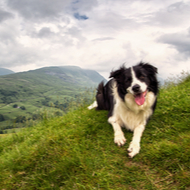
Pet owners urged to plan ahead of holidays this summer.
Vets in some of the UK’s top tourist destinations are said to be 'busier than ever' ahead of the easing of coronavirus restrictions on Monday (19 July).
The BVA says that it has been hearing from members in the South West in particular about an influx of tourists and the need for pet owners to plan ahead if they need access to veterinary provisions.
With a rise in holiday bookings, the start of the school summer holidays, and an increase in pet ownership during the pandemic, it could put extra pressure on many practices already struggling with the impact of COVID-19.
In a bid to avoid overwhelming practices in popular holiday hotspots, the BVA has put together a checklist that includes specific actions owners can take ahead of their ‘Great British Petaway’.
The actions include speaking to their local vet about preventive healthcare before travelling, making sure they have enough supplies of any medication their pet might be taking, and identifying a local vet in the area where they will be staying.
BVA Senior Vice President Daniella Dos Santos said: “We’re hearing from vets in popular holiday hotspots that they are already busier than ever, and with lockdown restrictions easing and school holidays around the corner, summer breaks in the UK with pets are only expected to soar.
“Pets are a huge part of the family and so it’s understandable that some owners will want to take them along on holiday, but it’s important to plan in advance. Of course, emergencies may happen and vets will always be there for you and your pets, but with some preparation ahead of travel, you can help avoid overwhelming local veterinary practices in your destination as well as ensure peace of mind for you and top health for your pet.”



 The Veterinary Medicines Directorate (VMD) is inviting applications from veterinary students to attend a one-week extramural studies (EMS) placement in July 2026.
The Veterinary Medicines Directorate (VMD) is inviting applications from veterinary students to attend a one-week extramural studies (EMS) placement in July 2026.